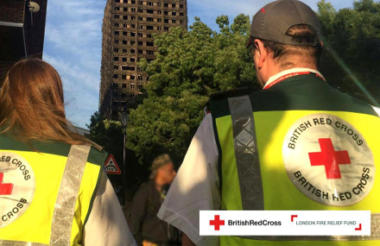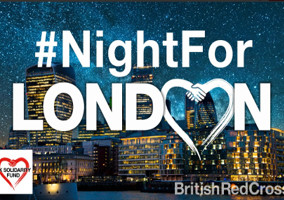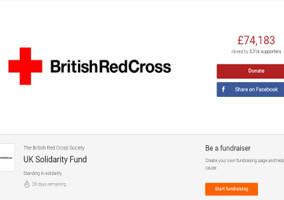A year on from the Westminster Bridge terror attack, Mike Adamson, chief executive of the British Red Cross, looks at the role charities have played in a year of emergencies and what they can learn for the future.
A year ago today the Westminster Bridge terror attack shocked the nation. It was the beginning of a summer of UK emergencies. Each one devastated families across the country and led to it being one of the most demanding years for the British Red Cross since WWII.
While the emergencies of last year brought untold tragedy to so many people, it also saw remarkable acts of kindness. It is this national desire to help people in crisis that the voluntary sector can and should harness. We can be the bridge with national and local government to deliver an emergency response that puts people’s needs at its heart.
During these emergencies there was a highly visible response from different voluntary and community groups. It saw the sector play a vital role from both within and outside existing formal structures. However, we also learnt a lot and know that sometimes it took time for our organisations to provide support in a collaborative, joined-up way as promptly as people deserve - some of this may have been inevitable in difficult circumstances, but there is room for improvement.
Involved in all major incidents across the summer, including the Manchester Arena bombing, Grenfell Tower fire and the London Bridge terror attack - this experience has given the Red Cross a unique perspective into the role the voluntary sector plays when an emergency happens and how this interacts with the overall response. We have set out these learnings in Harnessing the power of kindness for communities in crisis, outlining a renewed role for the sector, which puts people in crisis at its heart.
When an emergency happens, the British Red Cross mobilises from our pool of 20,000 volunteers. We set up rest centres at the scene, provide psychosocial support, deploy ambulances and support the NHS, trace missing family members and staff telephone support lines. And, importantly, we provide a platform for the outpouring of generosity across the nation in the wake of these tragedies, with people donating their time and money. Hundreds of Red Cross volunteers supported people last summer and we raised an incredible £28 million for those affected.
'Play to our strengths as a sector'
As a national and international organisation, we want to use our experience and long-term commitment to emergency preparedness, response and recovery to help the sector be the best it can possibly be in this space. This means playing to our strengths as a sector and as individual organisations, small and large, to support people in emergencies. We are glad to be working with partners to develop proposals for how we do this and stand ready to play our part, including a convening role with government, where appropriate.
We can also use our resources to support and strengthen other organisations and ensure a strong and consistent voice in Local Resilience Forums. Part of our own learning from the response, particularly at Grenfell, was the need to improve our ability to engage at grassroots level and we are piloting a community engagement approach, helping to create resilience and provide a platform for community voices. This will help guide our approach to working with diverse communities in an emergency situation.
'Refresh the sector's relationship with statutory bodies'
Furthermore, we would like to refresh the sector’s relationship with statutory bodies. When an emergency happens, could we respond proactively without waiting to be ‘invited’ to support? This would allow us to respond far more rapidly in a need-based way in the immediate aftermath.
The voluntary sector has a responsibility to harness public kindness as effectively as possible. We need to make it easy for people to give their time. Community Reserve Volunteers, a brand new volunteering opportunity launched by the Red Cross for those who want to offer immediate help in their local area, provides a platform for people to volunteer when they’re needed.
We need to make it easy for people to donate money and understand where it goes. Greater co-ordination of fundraising, would make it clear where the public can donate and easier for recipients to understand how they can access it quickly and easily. This fund should also maintain reserves so that support can be immediately issued after a major incident.
'Better coordinate our practical work'
As a sector we can also better coordinate our practical work. A single telephone support line with one number that is available 24/7, so there is one destination for support and information, would streamline our efforts. Direct assistance through initiatives like immediate cash assistance would enable people to buy the essentials they need in the aftermath of an emergency – such as food and clothes. We know from our international work how effective cash assistance is in meeting people’s needs while preserving their dignity.
The voluntary sector has been placed in a unique position, straddling the world of grassroots community groups and national resilience planning. It is this position that will enable us to learn from the heart-breaking events of last year, to marry local insight with national planning and put people’s needs at the centre of UK emergency response.
Mike Adamson is chief executive of the British Red Cross.
|
Related articles












